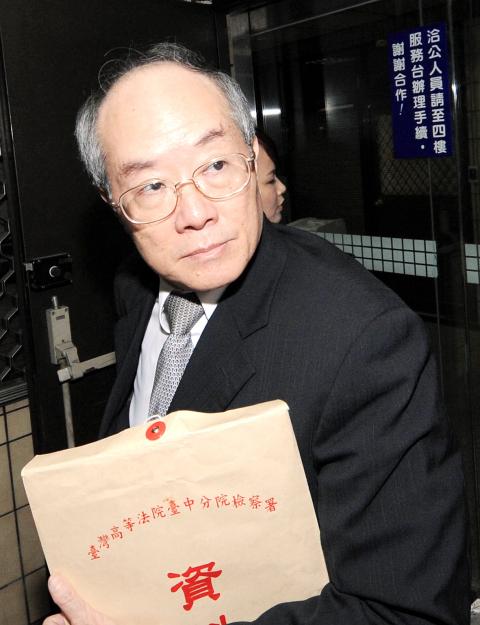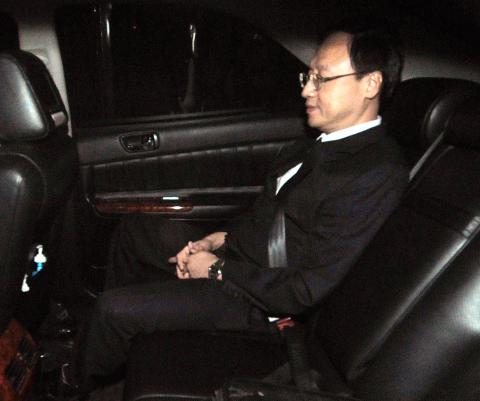President Ma Ying-jeou (馬英九) was summoned by the Taipei District Prosecutors’ Office yesterday evening as a witness in a case involving Prosecutor-General Huang Shih-ming’s (黃世銘) alleged leaks of details of an investigation into allegations of improper lobbying against Legislative Speaker Wang Jin-pyng (王金平).
Premier Jiang Yi-huah (江宜樺) and former Presidential Office deputy secretary-general Lo Chih-chang (羅智強) were also subpoenaed as witnesses last night.
Ma, Jiang, Huang and Lo were questioned individually.

Photo: Taipei Times
Ma is the second sitting president to testify as a witness. Then-president Chen Shui-bian (陳水扁) testified in Hualien County as a witness in a corruption case in 2004.
Neither Ma nor Jiang appeared before reporters after their visits to the prosecutors’ office and did not issue any statements.
However, Huang, who has been listed as a defendant in the investigation, said he is innocent.

Photo: Taipei Times
“I have no regrets at all about what I did. I did not do anything wrong that let Taiwanese down, nor did I do anything that has tarnished the position of prosecutor-general. I am sticking to what I have done and I will keep doing it,” Huang told reporters after he was questioned.
Lo declined to reveal details of his testimony, saying: “It takes courage to stand on the same side as Ma, which is the side of the minority at this moment.”
He resigned on Sept. 12, citing the improper lobbying scandal, as well as family and personal reasons for his decision to quit.
The prosecutors’ office began its investigation yesterday after several lawyers and citizens filed lawsuits against Huang over the alleged leaking of secrets in the Supreme Prosecutors’ Office Special Investigation Division’s (SID) probe into a case involving Wang and Democratic Progressive Party caucus whip Ker Chien-ming (柯建銘).
The prosecutors summoned Ma to clarify the details of meetings he had with Huang on Aug. 31 and Sept. 1, five days before Huang called a press conference to accuse Wang of the misconduct.
Ma has previously defended the legitimacy of his private interactions with Huang and dismissed allegations that he had instructed Huang on how to handle the allegations against Wang, but said that, as a citizen, he was obligated to testify in court. He also said that his testimony would be able to help prosecutors and he did not think his appearance before them would have a negative effect on the presidency.
The Presidential Office notified the Taipei District Prosecutors’ Office yesterday afternoon that Ma was available to report to the office last night. Ma arrived at the prosecutors’ office at about 8pm, taking a secret passageway to avoid reporters. Huang was already being questioned when Ma arrived.
Both Ma and Huang have said that the allegations against Wang involve administrative misconduct and that it is not a criminal case.

SECURITY: As China is ‘reshaping’ Hong Kong’s population, Taiwan must raise the eligibility threshold for applications from Hong Kongers, Chiu Chui-cheng said When Hong Kong and Macau citizens apply for residency in Taiwan, it would be under a new category that includes a “national security observation period,” Mainland Affairs Council (MAC) Minister Chiu Chui-cheng (邱垂正) said yesterday. President William Lai (賴清德) on March 13 announced 17 strategies to counter China’s aggression toward Taiwan, including incorporating national security considerations into the review process for residency applications from Hong Kong and Macau citizens. The situation in Hong Kong is constantly changing, Chiu said to media yesterday on the sidelines of the Taipei Technology Run hosted by the Taipei Neihu Technology Park Development Association. With

CARROT AND STICK: While unrelenting in its military threats, China attracted nearly 40,000 Taiwanese to over 400 business events last year Nearly 40,000 Taiwanese last year joined industry events in China, such as conferences and trade fairs, supported by the Chinese government, a study showed yesterday, as Beijing ramps up a charm offensive toward Taipei alongside military pressure. China has long taken a carrot-and-stick approach to Taiwan, threatening it with the prospect of military action while reaching out to those it believes are amenable to Beijing’s point of view. Taiwanese security officials are wary of what they see as Beijing’s influence campaigns to sway public opinion after Taipei and Beijing gradually resumed travel links halted by the COVID-19 pandemic, but the scale of

A US Marine Corps regiment equipped with Naval Strike Missiles (NSM) is set to participate in the upcoming Balikatan 25 exercise in the Luzon Strait, marking the system’s first-ever deployment in the Philippines. US and Philippine officials have separately confirmed that the Navy Marine Expeditionary Ship Interdiction System (NMESIS) — the mobile launch platform for the Naval Strike Missile — would take part in the joint exercise. The missiles are being deployed to “a strategic first island chain chokepoint” in the waters between Taiwan proper and the Philippines, US-based Naval News reported. “The Luzon Strait and Bashi Channel represent a critical access

Pope Francis is be laid to rest on Saturday after lying in state for three days in St Peter’s Basilica, where the faithful are expected to flock to pay their respects to history’s first Latin American pontiff. The cardinals met yesterday in the Vatican’s synod hall to chart the next steps before a conclave begins to choose Francis’ successor, as condolences poured in from around the world. According to current norms, the conclave must begin between May 5 and 10. The cardinals set the funeral for Saturday at 10am in St Peter’s Square, to be celebrated by the dean of the College